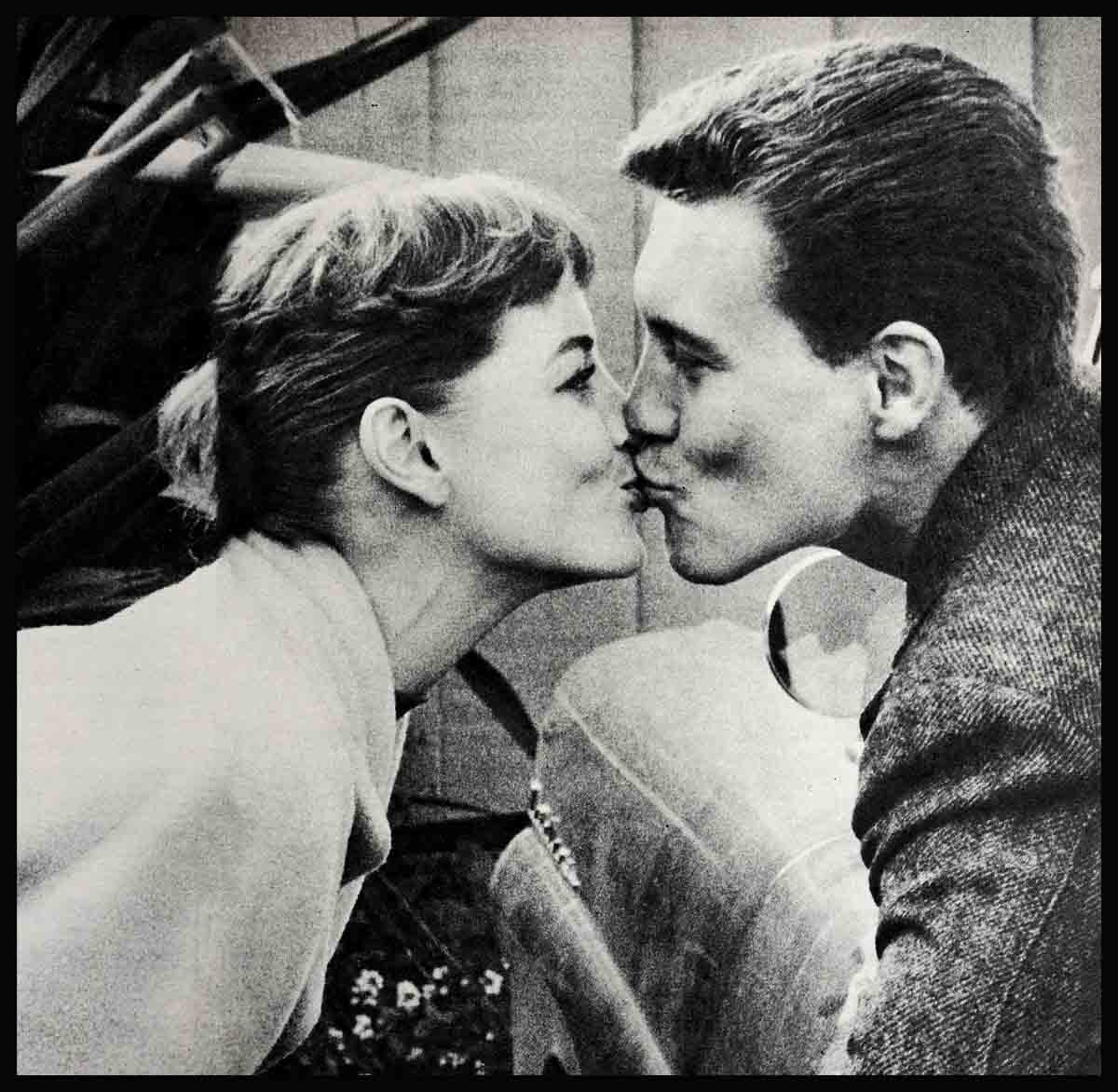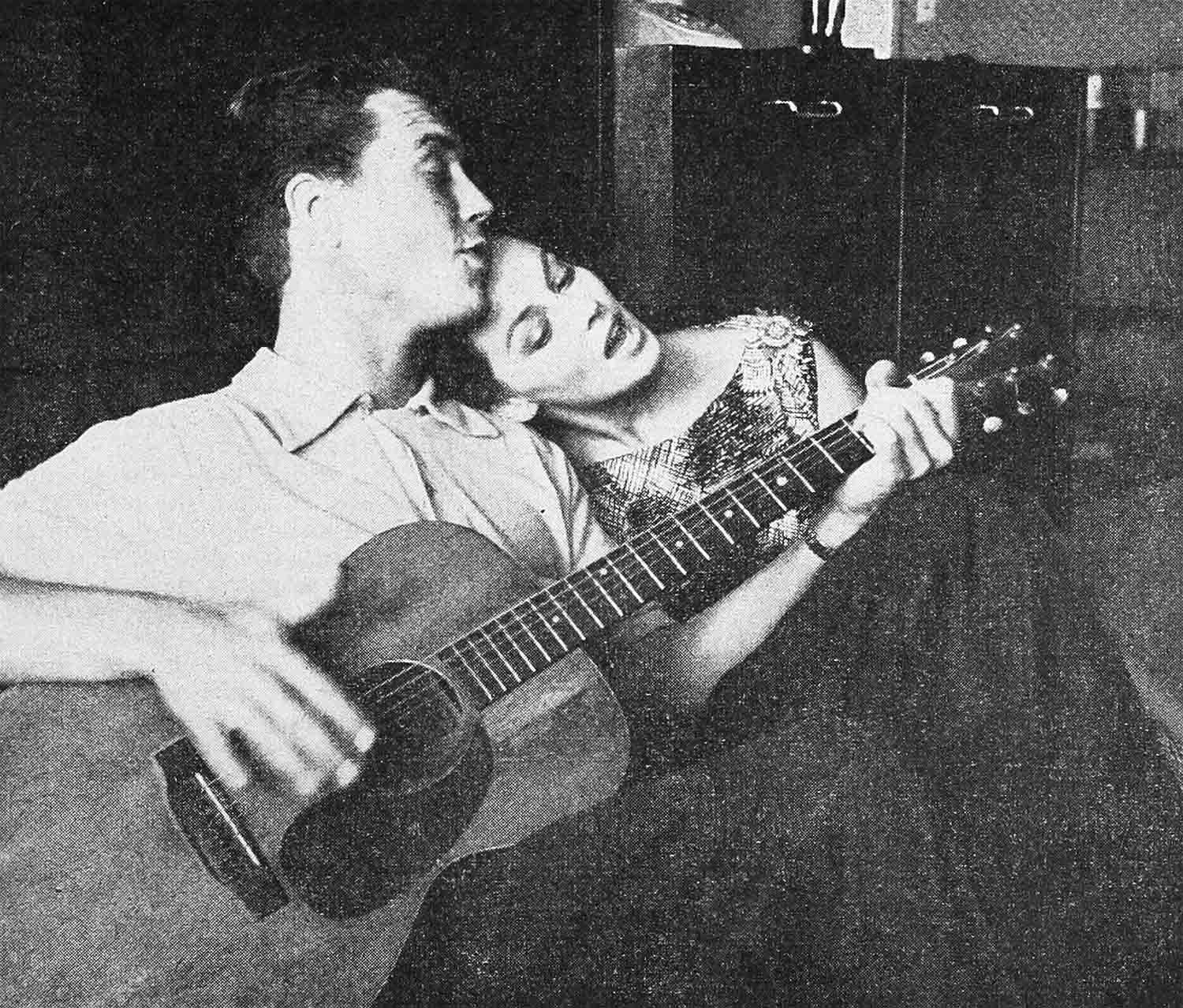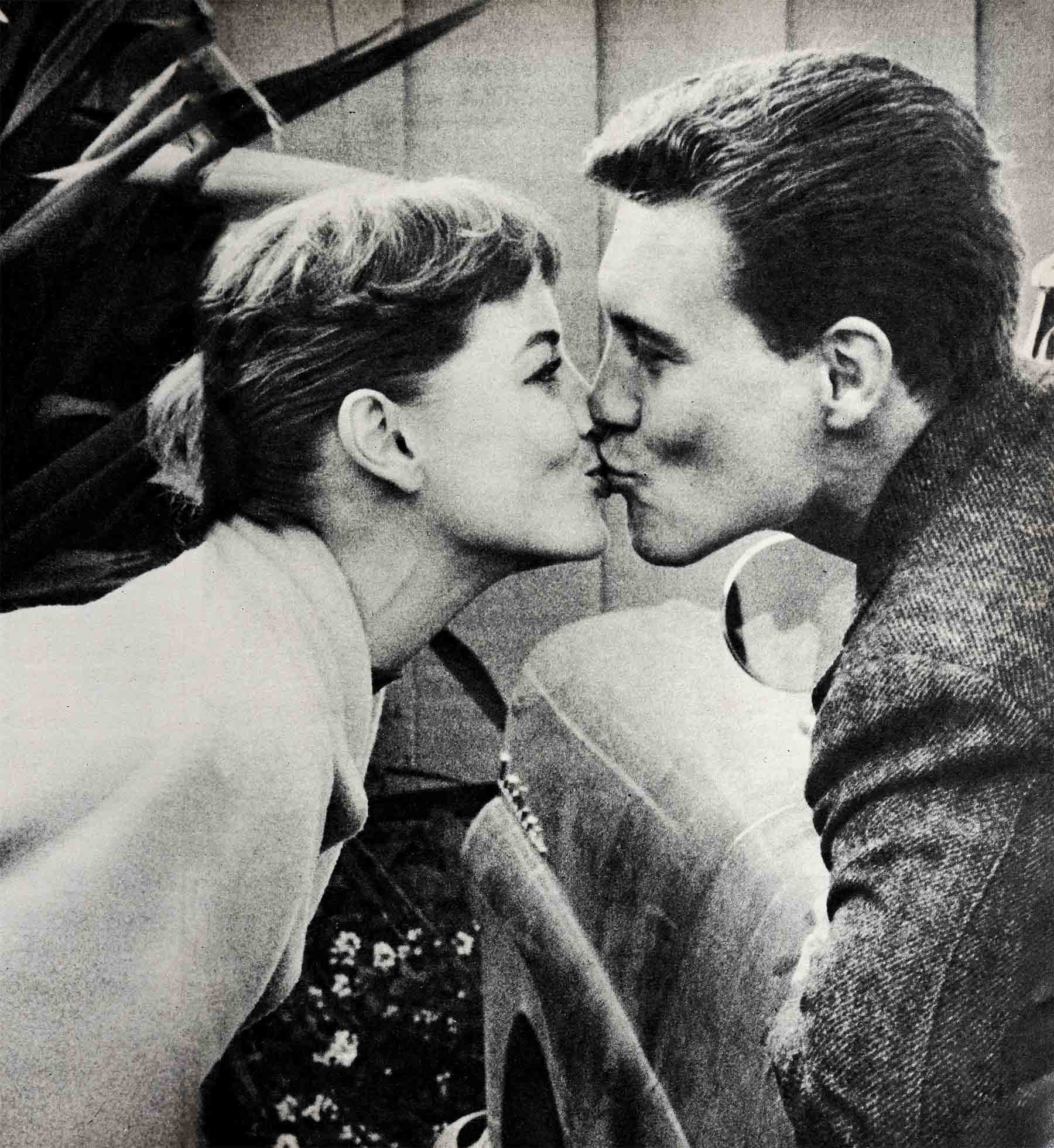
Roger Smith To Wife, Victoria Shaw
It was almost eight o’clock by the time Roger Smith, tired after a long day at the studio, turned the key in the lock of the front door of his home. Walking inside, he took off his jacket and threw it over the arm of a chair. Then, looking over towards the kitchen, he was about to call out to his wife, Vici, when he remembered—she was still away on location. He groaned. Another evening by himself. It seemed longer than two weeks since Vici had gone.
He walked through to the kitchen and opened the icebox, thinking how quiet the house seemed without her. Pulling out a long package, he glanced at the label: “TV Chicken Dinner,” it read, picturing a gaily colored platter of food. He placed the package on one side of the stove, pausing just for a second to glance around at the silent, empty rooms.
Then he began pacing restlessly around. Somehow he just couldn’t relax. He turned on the television set, clicked through a few stations, but soon turned it off again, impatiently. Then he walked over toward the staircase and, leaping up two steps at a time, he turned right at the top and peeked into the children’s room. A tiny baby and a two-year-old girl lay sleeping in pink and blue organza-covered cribs. He leaned over and kissed them both lightly and affectionately on their foreheads. Then he turned and went downstairs again.
Suddenly his face lit up, as though a thought had occurred to him. He went over to the telephone and, picking up the receiver, began to dial a number. “Hello . . . Vici? . . . hello, darling?” he said a few moments later.
“Oh … Roger,” she answered. And he could tell she was smiling.
“How’ve you been, honey?” he asked.
“As fine as when you called earlier,” she laughed. “I just got in, as a matter of fact. Thank heaven we’ve almost finished shooting that scene. Now I’m sure I’ll make it home by the weekend.” She paused. “How are the children?”
“Fast asleep.”
“Did Tracy eat her dinner?”
“I’m sure she did because Mary had no complaints tonight . . . but Vici,” he hesitated for a moment, “that’s . . . that’s not why I called.” There was an awkward silence. Then he added, “Did I . . . did I remember today to tell you that I love you?”
There was silence at the other end of the wire. Then a small voice whispered, “Yes . . . yes, darling. I love you, too.”
“Goodnight, Vici,” he said softly.
“Goodnight.”
Roger slipped the receiver back onto the telephone and smiled. In the beginning, it hadn’t been like this. He hadn’t felt the same. He’d loved Vici, sure—but not, somehow, the way he did now. When he used to tell her he loved her, the words never seemed to have quite the meaning he felt in them today. Love grows, he thought, it changes. . . .
Three years ago, when they were first married, he’d been far too jealous of her, feeling unsure of her love for him and so wanting to fight every man that even looked at her. There’d been that day in early summer when they’d been driving through a side-street out of the city and had stopped for a traffic light. Some boys standing on the corner outside a drug store had begun to whistle at Vici.
“Hey—cutey!” one of them had shouted. “How’s about getting out of that car?”
“Yeah—we wanna meet you.”
Sitting at the wheel, he remembered getting madder and madder. As he turned to look across at Vici, he noticed she was sitting quite still, ignoring the remark.
“I’ll show them,” he’d said finally. “Just you watch.” And he grabbed the doorknob roughly, about to get out.
“Stop! Roger—no,” she told him. “Please—” Then she added, “Anyway, the light’s green—let’s go . . . darling—please?”
He looked back at the boys, then at Vici. Finally he shrugged his shoulders, turned back to the wheel and eased off the brake.

Their biggest quarrel had been a jealous one—all over a cigarette lighter one of her former boyfriends had given her. It was a beautiful lighter, engraved “To Vici with Love,” with the fellow’s name under the inscription. He’d been convinced the boy had purposely given her a gift like that so that every time she smoked a cigarette she’d be reminded of him. And all her reasoning couldn’t change his view.
“But darling,” she said, “this lighter doesn’t mean anything to me anymore. I love you, remember! But it’s a lovely thing and I can’t see any sense in throwing it away just because you didn’t give it to me.
But every time she lit a cigarette with it, it burned him up!
Then, just before they were married, they drove to Arizona to spend two days wih his folks. On Sunday afternoon the subject of the lighter happened to come up, and Vici, who’d been tense all weekend, suddenly began to cry. And then, minutes later, she ran out of the house. He followed her. The house is on top of a hill and, just as he got past the front door, he noticed that she was standing at the edge of the cliff, one arm raised high in the air. She was tossing the lighter over the side.
“Honey, why did you do that?” he screamed out.
“Because I’m sick of us arguing over something that means nothing to me, and yet bothers you so much. I’d rather have you be happy than have the lighter.”
Then she added, “But Roger, it was really an awfully nice lighter.”
Suddenly the corners of her mouth broke into a smile and that seemed to break the tension. They began laughing—and then they kissed.
The next day they were due to return to Hollywood. But before they left, he told her he wanted to stop downtown and say hi to an old high-school buddy. Instead, while she waited back at the house, he found a jewelry store, searched the showcase until he had come up with an exact duplicate of the lighter, then waited while it was engraved with the same words (except the signature) as before. He didn’t have it wrapped, but simply put it in his shirt-pocket and planned a big surprise presentation. But it backfired.
As soon as they got on the road, he asked boyishly, “Would you like a cigarette?”
“No,” she answered, unsuspectingly. Then he puffed out his chest until she couldn’t help noticing the outline of a lighter in his pocket. She didn’t say a word. Actually, though, while he didn’t know it at the time, she thought he’d spent the morning searching for the original lighter at the foot of the hill, and she was so sick of the whole subject she was determined to hold out for the entire eight-hour drive without smoking.
Finally, however, he became impatient. He took it out of his pocket and dropped it in her lap. She looked at it quickly and, since it was a duplicate, she assumed it was the old one and started to cry.
“Honey, look again,” he said softly.
Then, when she saw his name engraved on it, tears really started to roll down her face, and for the next hour she sniffled into a tissue and snuggled up to him like a kitten.
After they’d been married a while, Roger remembered, he lost that overly jealous streak. He knew Vici loved him. He was secure—there was no need to have a fit every time a man so much as glanced at her. Instead, he started to feel proud when she got stares and compliments.

But Vici’s own lack of jealousy and possessiveness used to bug him in the beginning, when he wasn’t sure of her love. Frankly, he knew he couldn’t make his wife jealous, even when he wanted to. She never questioned him. But now, now he understood how much she really loved him, he realized how good it felt for a married man to know that, say, if he called his wife to tell her he had to work late, or go to a business meeting, she wouldn’t third-degree him about it. You can’t put chains around love, he thought, you can’t put love in a package marked “Fragile,” you just have to have trust and faith, because when real love exists between two people nothing or no one can shake it.
Before he was married, Roger remembered how he used to wonder why a man could go through such frightening experiences in a war, learn to defend himself and not give in or give up and yet, why the same man could be reduced to quivering jelly if a certain girl shed a tear or gave him a rough time. Now he felt he knew why: You have to live with a woman to understand one.
And he began to think about an article he had read recently on the subject of women that said one of the most important challenges most men face over a lifetime is to learn to get along with women. Start, it advised, by realizing that, since a woman’s mind is completely different from a man’s, it is almost impossible to second-guess a woman—in fact, it’s usually futile even to try. Many things she does probably seem to you silly, stupid, rash, impractical. And this is what causes most of the arguments between the sexes, battles that could be avoided if only a man wouldn’t try to use his own rational attitude in analyzing a woman’s behavior.
Roger smiled to himself, remembering something that had happened a short while back that had made him realize the truth of the piece. . . .
It was early evening and he’d just come home when she bounded up to him wearing something on her head that looked like an eggbeater. It was brilliant orange.
“Do you like my new hat, darling?” she cried, beaming.
He glanced at it, and, saying the first thing that came into his head, murmured, “Gee, honey, not particularly.”
That did it. She turned away, lowering her head, and when he put his hand under her chin to turn her head back toward him, he could see that she was almost in tears.
“But honey, you’ve got dozens of hats I like,” he began, trying hard to understand why such a small comment should have made her so upset. “Is it such a tragedy that I just don’t happen to like this one? Besides,” he added as an afterthought, “you know you look good in whatever you put on.”
But even this didn’t help. She wouldn’t say another word. Instead, she took off the hat and walked sullenly away. “Honey,” he called, chasing after her as she went into the bedroom to put it back in a large round box that sat on a chair, “what difference does it make whether I like it. It’s you who has to wear it, and if you like it, then that’s all that matters.”
She’d put one hand to her face and was wiping her eyes . . . she was really crying. He didn’t know what else to say.
Then in a small voice she said, “But Roger, I only bought it because I wanted you to like it.”
All through dinner they were silent. He tried to talk about other things, but she would just smile weakly and say, “yes” or “no” at appropriate times. Then, just after they finished, and she was clearing the table, he went up to her and put his arms around her. “Honey,” he said softly. “Don’t worry about the hat. I didn’t really get a good look at it the first time. But I just went to look at it again in the box, and, honestly, it’s really one of the most beautiful hats I’ve ever seen.”
The effect was magical. Her face lit up and she smiled a wonderful smile. “Oh, darling, I’m so pleased,” she said. “Would you like me to try it on again?”
Yet the big problems she took in her stride . . .
Like that day when he came home from the studio feeling particularly depressed because so much seemed to be going wrong. “Vici, I’m quitting,” he said decidedly, shutting the door firmly behind him as he came into the house. And without another word he headed straight for the bedroom. Kicking off his shoes, he lunged onto the bed and began staring at the ceiling.
Why doesn’t she come up and try to talk me out of it, he thought. Maybe she wants me to quit—maybe she’s as sick of this kind of life as I am . . . or am I? If only someone could tell me. . . .
It must have been about fifteen minutes later when Vici called out, “Dinner!” Then she added, “You do want dinner, don’t you?”
“Yes . . . I’m coming,” he murmured, swinging reluctantly off the bed.
She didn’t question or try to speak to him during the meal, even overlooking terse remarks he was making about the food. “We’ll go back to Arizona and I’ll work for my father,” he said finally, over coffee.
“Would you really be happy manufacturing clothes?” she asked quietly. Without waiting for an answer, she got up and put a hand on his arm. “Come on,” she said, “let’s go into the living room and talk it over.”
And as they both relaxed in armchairs and began to talk, Roger began to see how much he would be giving up if he left Hollywood; how much he would miss acting; and how actors, like other people, had to go through bad as well as good times. And thinking back on that evening, he realized how valuable Vici’s understanding had been to him. No one else, he thought, could have done the ‘same. Surely, this was a wonderful part of their good marriage.
Today, Roger says, “If a woman could try to understand how a guy feels about marriage, it would help lots of times. To a guy marriage can become a chore—or it can be made an exciting experience. And I think women should try to realize, too, how differently a man looks at marriage; it is her whole life, yet for him, it is only a part—though a large one, I admit—of what he needs to be happy and satisfied in his work.
“Life with Vici is exciting and full of surprises. I’m resigned to the fact that tomorrow she may buy another hat that looks like an eggbeater, but which—this time—I’ll admire profusely. I’m convinced, also, that it won’t be too long before we sell our modern home and move into her latest ‘passion,’ a two-story colonial, which I’m sure she’ll be ready to move out of after two months. I’m fully aware, too, of the fact that she’s as changeable as the weather—about everything except her feeling for me. And since that’s the basic thing to keep constant, her little whims are pretty unimportant. So I’m content to spend the rest of my life applying a ‘formula’ to calm her female brainstorms. The thing that matters most is that, because of her love, I’m confident and prepared to face whatever tomorrow may bring!”
THE END
ROGER SMITH CO-STARS IN WARNERS’ “77 SUNSET STRIP,” ON ABC-TV, 9:30-10:30 P.M. EDT, FRIDAYS, WHILE VICTORIA CAN BE SEEN IN THE COLUMBIA MOVIE, “RIM OF THE CANYON.”
It is a quote. PHOTOPLAY MAGAZINE AUGUST 1959




